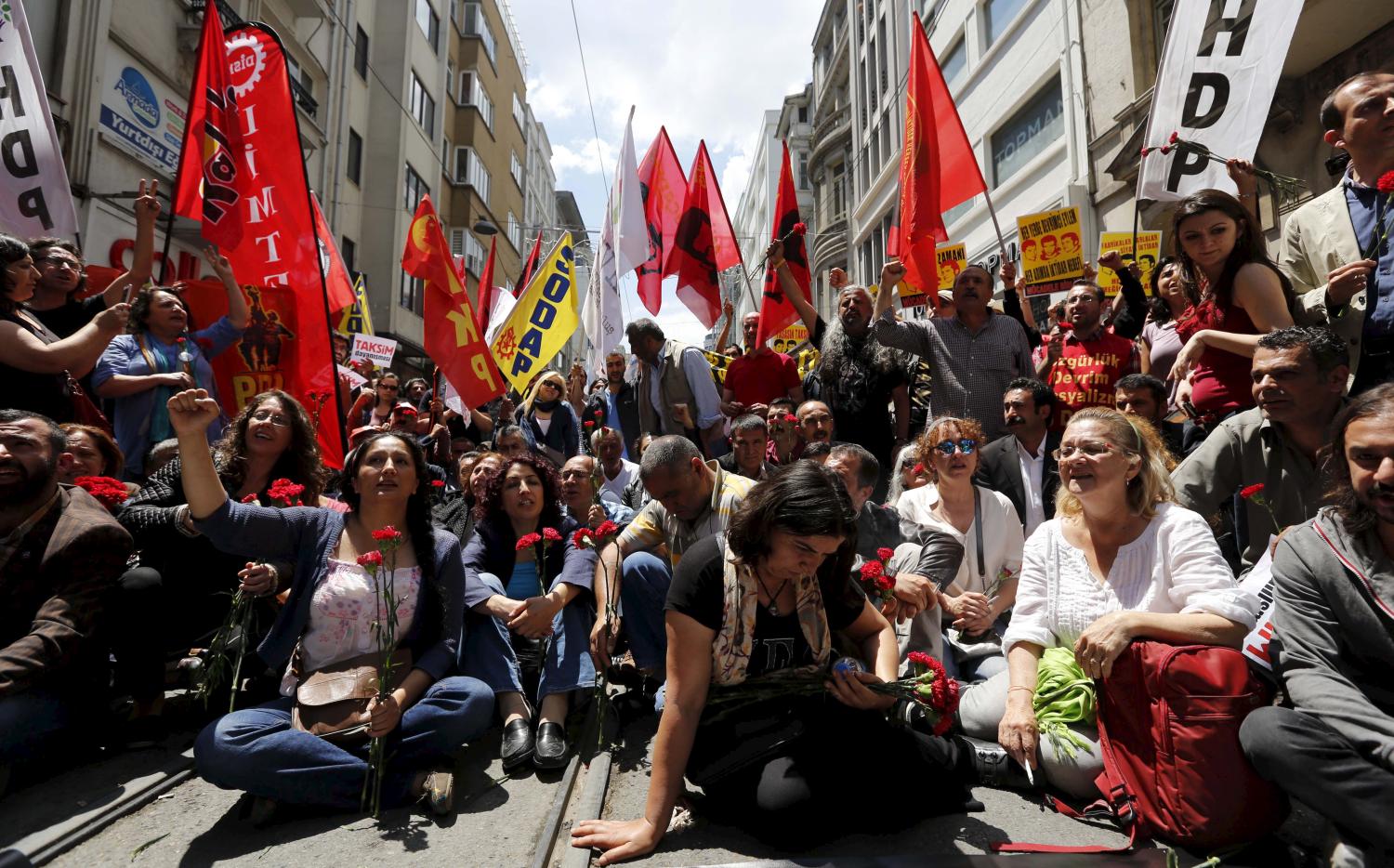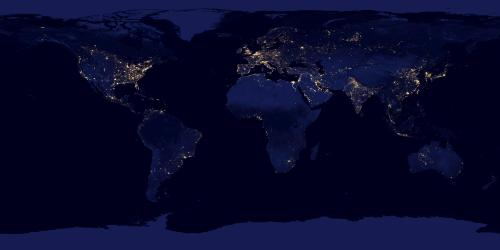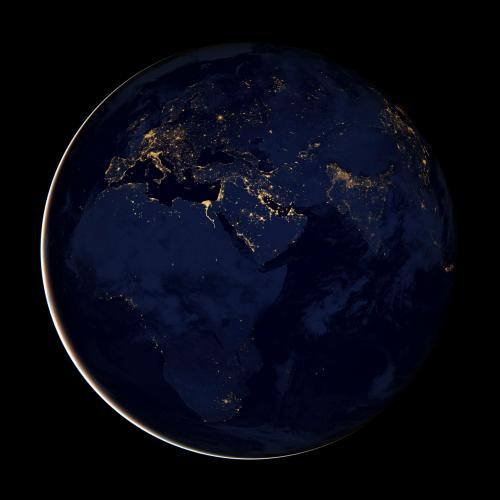Democratic states and institutions are under increasing strain from a potent combination of external and internal challenges. Externally, a revanchist though economically diminished Russia is pressuring the West through its conventional and hybrid military capabilities and through savvy manipulation operations. Putin has seized Crimea, destabilized Ukraine, intervened in Syria, and meddled in U.S. and European elections. A resurgent and far more powerful China is advancing its political, economic, and military influence regionally and globally. Beijing has escalated its pursuit of territorial claims in its maritime domain and is using its economic clout to pressure political systems from East Asia to Europe. These developments are illustrative of a new era of geopolitics, which, at its heart, involves competition over internal political systems.
Concurrently, key regions and countries around the world are experiencing a recession in democratic liberalism. Democratic states are struggling with internal challenges including economic disparity, social upheaval, and political disarray, demonstrated through burgeoning nationalist and populist movements from both the left and right of the ideological spectrum. Following decades of democracy’s “third wave,” beginning in the mid-1970’s and accelerated by the fall of the Berlin Wall and collapse of the Soviet Union, there is a prevailing perception among analysts and policymakers that this momentum has run its course.
Of particular concern is the rise of anti-liberal sentiment and parties in the European core. Given the trans-Atlantic community’s role as the primary instigator and promoter of democratic progress in the post-WWII era, this worrying shift has consequences for democracy’s trajectory and the future character of the international order. Of course, the world is not neatly divided between the democratic West and resurgent authoritarian powers; much of humanity lives in the contested middle and in emerging powers such as India, Indonesia, Brazil, and Nigeria. But even where democracy is rising among these actors, they are reticent toward advancing liberalism globally.
Much ink has been spilled on each of these phenomena, but less consideration has been given to the interplay among them. This article seeks to frame that interactive debate, assess democratic setbacks and progress across regions, and outline the geopolitical consequences of democratic retrenchment.
A GLOBAL SNAPSHOT
On a global scale, studies on democracy’s strength worldwide show worrying results.
On a global scale, studies on democracy’s strength worldwide show worrying results. The Varieties of Democracy Project (V.Dem), the world’s largest database on democratic indicators, finds that more countries experienced democratic backsliding than improvement over the last five years, indicating that we may be on the verge of a global democratic recession. Similarly, Freedom House notched its 12th consecutive year of decline in global freedom.
Powerful and advanced democratic states are central to these concerning statistics. The world’s most important shaping power, the United States—itself a revisionist power bent toward liberalism and democracy—is in strategic flux and appears to be withdrawing from its commitment to supporting and exemplifying democratic standards. The European Union, the other bulwark of the liberal order, has turned inward, facing domestic instability caused by characteristics inherent to a more open order, including economic integration, low trade barriers, and the free movement of people. In response, elections throughout 2017 and into 2018 ushered right-wing populist parties into parliaments in France, the Netherlands, Germany, Italy, and Austria. The surge of right-wing populism is most notable in Poland and Hungary, two countries at the forefront of Europe’s illiberal challenge. Turkey, a NATO member and EU accession state (albeit an unlikely one) has slid into near-authoritarianism under President Recep Tayyip Erdoğan.
Set against these negative trends are more positive developments outside the Western core. As Bruce Jones and Michael O’Hanlon have written elsewhere, several powerful and large countries—India, Indonesia, Nigeria, and Brazil, with a combined population of 2 billion—have, for all their admitted troubles, remained democratically stable in recent years. Latin America as a region (minus Venezuela) has survived earlier populist challenges to democracy that many skeptics thought it would not. In Africa, nascent democracy has spread to at least a third of the continent. While much of this democratic progress benefited from outside assistance in its early stages, there is ground for cautious optimism that governance progress in Africa will endure. Globally, a longer-term perspective paints a moderately positive picture, as there is still far more democracy in the world than there was before the end of the Cold War. The combination of these positive and negative snapshots has led to considerable debates over the health of democracy worldwide.
ASSESSING DEMOCRATIC SETBACKS AND PROGRESS
Speculation of a global democratic recession requires us to ask, how safe is a democratic state from backsliding? Recent trends suggest that conventional wisdom regarding this question may be wrong on two accounts: First, research has long held that democratic consolidation is a one-way street. Empirical studies have suggested that wealthy democracies, once reaching a certain level of GDP per capita, are immune to democratic breakdown. This may no longer be the case as signs over the last decade show that even economically strong democracies are not safe from backsliding. Moreover, illiberal states have proven adept at providing economic and social goods to their citizens. Since initiating market reforms in 1978, China has lifted hundreds of millions out of poverty. Vietnam, Singapore, and Ethiopia are other moderately successful cases of market authoritarians. Their economic strengths illustrate that nations do not need to democratize to reap the benefits of the global economy.
Second, coups and insurgencies have historically been perceived as the gravest threats to democratic states. Too often, debates over a democracy’s ostensible decline do not acknowledge more gradual forms of democratic setbacks. More insidious challenges include long-term public trust deficits in democratic institutions (which have paved a path for resurgent populist parties) and seemingly democratic tools (including referendums and constitutional amendments) that allow illiberal leaders to hollow out political opposition, judicial independence, and free press, while maintaining majoritarian support. Endemic corruption, sectarian divisions, and criminal violence are also significant governance challenges, but ones that do not elicit the same alarm as military coups, direct overthrows, and stolen elections.
Below are several illustrations of these more gradual democratic setbacks and the factors that drive them. Each requires a different set of responses from domestic civil society and political opposition, international institutions, and foreign governments. Questions over how to impede the advances of anti-democratic and illiberal forces are not unique to this moment in history. However, they deserve renewed and vigorous attention at a time when the trajectory of the international order is in serious jeopardy.
Discontent with democratic political institutions has been gradually building over the last three decades.
An erosion of trust in democratic institutions
The tide of public support for populist parties and candidates across regions may have shocked many observers, but discontent with democratic political institutions has been gradually building over the last three decades. Trust in institutions such as mainstream political parties, elected officials, policy experts, the media, and bureaucrats has precipitously declined in established democracies in North America, Europe, and parts of Latin America and Asia. Declining trust has occurred alongside a decrease in voter turnout and weak party identification. Signs of democratic discontent are particularly visible in Anglo-American democracies including the United States, the United Kingdom, Australia, Canada, and New Zealand, among other post-industrial societies. Moreover, data collected in the most recent World Values Survey suggests that younger generations in these societies place less value on living in democracies than their age cohort in earlier eras, and are increasingly open to authoritarian alternatives such as military rule or strongman leaders unconstrained by legislative or judicial oversight.
Resurgent populist parties
Across wider Europe and elsewhere, democracies are witnessing a rise in support for right-wing populist leaders. Democratic backsliding that garners broad popular support can be the most difficult to counter, as it means coping with illiberal actors and their mobilized supporters as they accrue power within the democratic rules of the game. Both right- and left-wing populist parties see themselves as taking back control of salient issues from out-of-touch elites operating through antidemocratic institutions. Highlighting their appeal, European intellectual Ivan Krastev writes, “They attract those who view the separation of powers (the institution perhaps most beloved by liberals) not as a way to keep those in power accountable but as a way for elites to evade their electoral promises.”
Many populist parties in Europe and elsewhere have captured discontent among the citizenry in ways that are not fundamentally illiberal, by advocating for protectionist trade policies and stricter immigration control. However, it is populist parties on the right—the Alternative for Germany (AfD) party, Austria’s Freedom Party, Hungary’s Fidesz Party, and Poland’s Law and Justice Party—that pose a graver threat to liberal institutions. These parties, while distinct from one another, espouse political platforms based on majoritarian ethnicities and religions, intolerance for minority rights, and disdain for judicial independence and free media. Their positions illustrate how right-wing populism is not only a symptom of institutional vulnerabilities, but also a threat to the very principles that democratic institutions stand for.
Entrenched corruption, violence, and sectarian divisions
Other factors driving populist politics and threatening democratic institutions across regions are corruption, criminal violence, and sectarian divisions. Recent history in Mexico, Brazil, India, and Indonesia highlights that citizens’ expectations for good governance have risen as their countries’ economic situations improve. Yet progress toward democratic norms and institutions has stalled in many nations. For instance, despite Brazil’s political and economic progress, there remain notably high levels of inequality, rising unemployment, and entrenched political corruption. Indonesia has made democratic progress since Suharto’s three-decade long presidency came to an end in 1998, yet the country is plagued by corruption, violence against minorities, and separatist tensions.
Factors driving populist politics and threatening democratic institutions across regions are corruption, criminal violence, and sectarian divisions.
India is an impressive case of post-World War II democratization evolving into a dynamic and pluralistic system, but Prime Minister Narendra Modi must do more to stem endemic corruption and long-standing communal violence and human rights abuses. In sub-Saharan Africa, despite signs of progress in Nigeria, many countries lack strong rule of law and maintain high rates of corruption, crime, and insurgency. Even South Africa, a relatively strong democracy, has been mired in a corruption scandal implicating former President Jacob Zuma, who eventually stepped down in February. These examples make clear that despite democratic progress, political and social upheaval can emerge when governments prove unable or unwilling to address criminal violence, reduce corruption among elite classes, provide equal access to services, and allow for viable political opposition.
The illiberal toolkit
Elsewhere, in nations as diverse as Poland, Hungary, and Turkey, illiberal leaders follow a similar playbook to exploit discontent in their societies to their own advantage, claiming majoritarian support to disregard checks and balances, and repress civil society, open debate, and minority rights. This playbook includes consistent efforts to weaken liberal democratic institutions including judicial oversight, pluralistic political systems, and independent media. Several recent illustrations prove that these leaders are making their mark. In Hungary, the Fidesz Party passed a series of constitutional amendments in 2013 limiting the power of the constitutional court and weakening judicial independence. Similarly, Poland’s Law and Justice Party, after coming to power in 2015, passed laws to limit the power and autonomy of the nation’s highest court, the Constitutional Tribunal. In Turkey, President Erdoğan moved to strengthen his presidential powers following the July 2016 attempted coup, through a referendum in April 2017 that reshaped his authority as an executive president. These tactics are rarely used in isolation, and illiberal leaders also build support among elites by empowering loyal oligarchic classes and business interests through financial incentives and cronyism.
The pull of power
Finally, the shifting balance of power away from U.S. unipolarity and overall dominance of the West toward greater competition with emboldened authoritarian states has implications for democracy, particularly in weaker and newer democracies. As China grows more powerful economically and militarily, its governance model becomes more appealing to leaders who seek economic growth opportunities without commensurate political liberties or restraints on their power. Alongside China’s rise, and following the Iraq War, America’s countervailing influence and willingness to shape democratic trajectories has diminished. The evolving balance of international power between the United States and China, along with China’s significant investments across the global South, provides smaller countries with new political and economic options. As America chooses to invest less in diplomatic tools, it is further limiting its ability to reinforce democratic norms outside the Western core.
DEMOCRACY AND INTERNATIONAL (DIS)ORDER
In sum, democracy’s resilience is being challenged by worrying shifts among and within powerful states and competing international orders. The United States is retreating from core aspects of its position of global leadership, risking ceding ground to China and others. In the economic realm, a more diffuse and multipolar order has developed in the wake of the 2008 global financial crisis. Within this geopolitical reality, political disarray and confusion in the trans-Atlantic community diminish the West’s ability to set common incentives for democratic progress, thereby enabling the growth of illiberal forces elsewhere. Emerging economies across the global South may be increasingly salient players on the world stage, but they cannot fill the void left by powerful liberalizing states.
These consequential trends leave democracy, and the future of the international order, in a contested state of flux. Previous eras characterized by a recession of powerful liberal states—read: the 1920s and 1930s—proved catastrophic not only for democracy around the world, but also for economic prosperity, global peace, and stability. We are far from this reality, but we must pay close attention to trends that would move us further down that road.
The Brookings Institution is committed to quality, independence, and impact.
We are supported by a diverse array of funders. In line with our values and policies, each Brookings publication represents the sole views of its author(s).












Commentary
Democracy in the new geopolitics
March 22, 2018